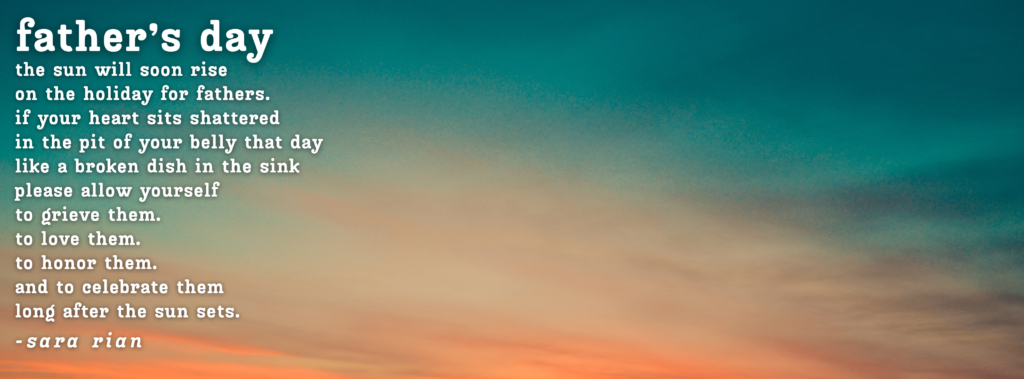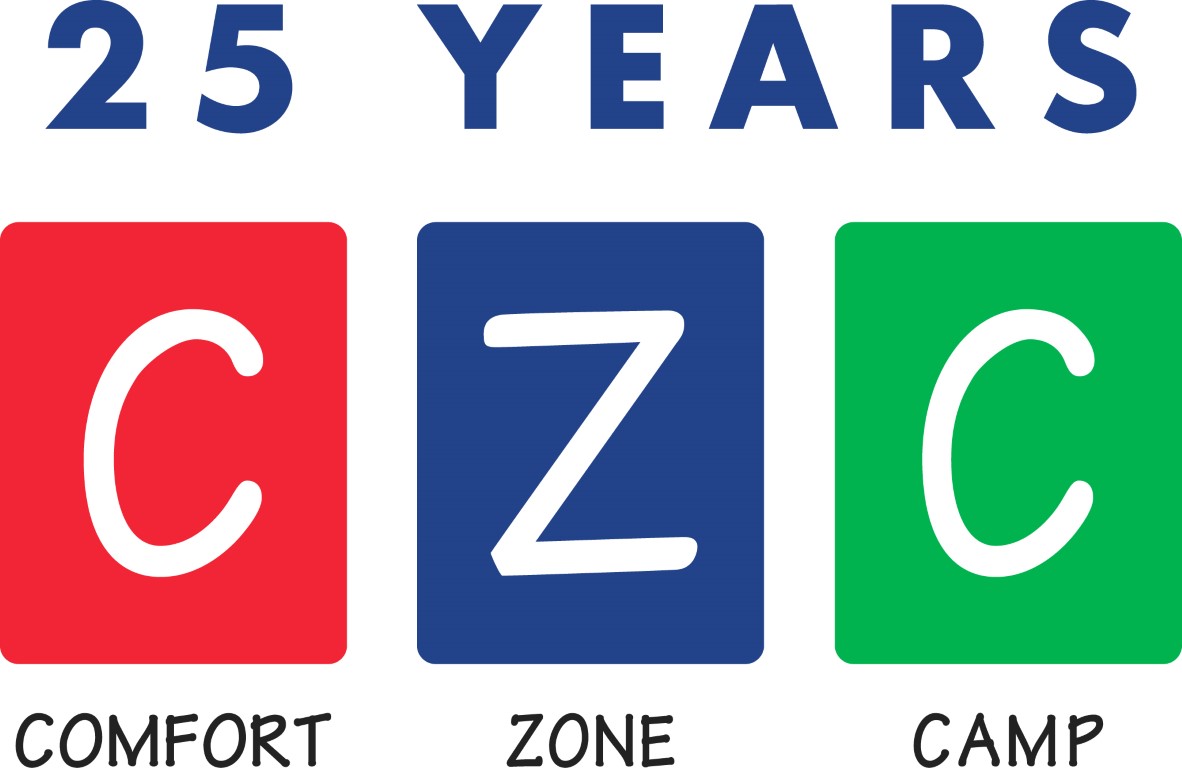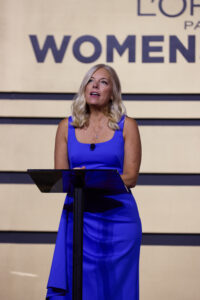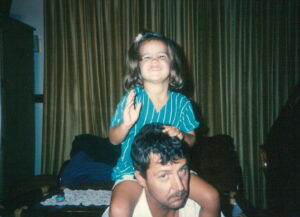Navigating Father’s Day After Loss

For many, Father’s Day is a joyful occasion to honor and celebrate the fathers and father figures in our lives. It’s a day for family get-togethers, thoughtful gifts and cards, and reflecting on cherished memories.
But for those grieving the loss of a father, the day can bring up painful feelings of sadness, longing, and emptiness. Reminders of the holiday are everywhere, making it difficult to avoid. Perhaps this is your first Father’s Day without your dad, or maybe it’s been many years since his passing – but the ache of missing him remains.
If you are coping with loss this Father’s Day, know that you are not alone. Grief is a highly personal journey and there is no right or wrong way to feel. Some may want to celebrate and honor their father’s legacy, while others may prefer a quiet day of reflection. Some may feel a mix of emotions – sadness but also gratitude, fond memories alongside the heartache.
We asked former campers and camper parents to share some of their thoughts on Father’s Day after experiencing a loss:
Katie Pereira; former camper turned staff:
- How did Father’s Day make you feel as a kid who’s lost a dad? I remember the first Father’s Day after my dad died. I was in second grade and we always did crafts in school to give to your dad. As the days kept approaching I remember feeling sad and angry and wishing for the day to not come around because I didn’t want to feel left out by not being able to give him the Father’s Day craft. After my dad died I felt completely isolated among my peers and the approaching Father’s Day always made the isolation feel stronger than ever. The craft that year was making a poem with photos. When the day came to make the craft, my teacher bought a wooden stick so that I could bring it to the cemetery and leave it at my dad’s grave. I felt supported in that moment and it made that first Father’s Day a little easier for me and helped ease the nerves of feeling left out that day.
Father’s Day always felt like a stopwatch. Time felt like it was moving each day, but then when Father’s Day hits, it stops because you feel like you have to be sad that day or you have to have to at least plan to be sad for the day. I always felt like there was pressure to do something specific to remember my dad. Then the day would come and I would notice I wasn’t sad or I wasn’t as sad I “should” have been. That’s when the guilt would set in. What I learned as the years went on is that you can feel however you want to feel on that day and that you do not always need to do something big on Father’s Day. Some of the most comforting father’s days were the ones where we enjoyed a family dinner together having one of my dad’s favorite meals. - What has has helped you get through days like Father’s Day? Looking at photos, cooking his favorite meals, talking about him with my family, and bringing flowers to the cemetery.
Krista Collopy; former camper turned staff:
- How did Father’s Day make you feel as a kid who’s lost a dad? Father’s day was challenging as a kid. I remember keeping my head down trying to avoid all of the Father Day’s advertisements and sales because it was a reminder that I didn’t have dad. I was jealous of all the kids who had dads.
- What has has helped you get through days like Father’s Day? What helped me on Father’s Day was planning something intentional to do that would honor my dad. Usually that meant going for a bike ride (that was our favorite thing to do together). On my bike ride, I would often talk to him and update him on my life. I would also pull out my “dad box” and look at old photos – anything to keep his memory alive and honor him as my dad.
Niki Russo; former camper turned volunteer:
- How did Father’s Day make you feel as a kid who’s lost a dad? My first Father’s Day without my dad was especially poignant, as it fell on my 11th birthday. Instead of celebrating, I was devastated, dreading a day that should have been joyful. It left me feeling empty, lost in grief and the harsh realization of his absence. He had passed away the previous November. While I made it through the first holidays in a numb state of shock, by June the full weight of the loss hit me. Seven months after losing him, the pain was raw and inescapable.That Father’s Day birthday marked a turning point – the heartbreaking comprehension that he was truly gone and I faced a lifetime of milestones and memories without him by my side.
The anger and jealousy that consumed me as a child on Father’s Day was overwhelming. Seeing others celebrate with their dads felt like a cruel reminder of what I had lost. I couldn’t bear to watch TV, as the constant commercials and specials honoring fathers only intensified the pain. It was simply too much to handle. As time passed, navigating the holiday became more manageable, but it also taught me that grief is an ongoing journey. Some years, the day would pass without tears, feeling almost normal. Yet other times, especially during significant life milestones, his absence would hit me a lot harder. - What has has helped you get through days like Father’s Day? I often try and do something that would have liked to do; go to a Yankee game or go to his favorite pizza place.
Amanda Lynch; camper parent:
- What’s the best way to approach your family’s first father’s day without dad? Our first Father’s Day without my husband Marcus was last year. I let my girls take the lead on how they wanted to celebrate or observe the day. We decided to do something their Daddy would have wanted to do and made it a day of fun and so my brother took them out for a “yes” day where they got to do literally whatever they wanted.
- What did you wish you knew or did with your kids? Marcus’s Dad passed away when he was very young. He shared a lot with me about what he wished he’d had as a child who’d lost his father. Many of those things didn’t exist forty years ago, but those supports exist now. So, I feel in some ways like he left notes for me. I am glad I gave myself and my kids space to decide how they wanted to spend their day. I’m also very thank for the ways my siblings, parents, and overall village have stepped up to support my kids. We could not get through each day without the support from others.
- Any traditions you started? We are still in the weeds a bit and taking things day by day. Last year they spent the day with my brother and they’ll likely do the same this year. I do know they will do something their Daddy would have wanted to do which will probably include buying toys and eating lots of candy. He was like a big goofy kid and I hope my girls never forget that. All he ever wanted to do was celebrate them, even on Father’s Day.
Here is some advice from our healing circle leaders:
Sam Cerami; Healing Circle Leader and Clinical Social Worker
- Consider a Break from Social Media: The day is likely to be filled with content celebrating others’ relationships with their fathers, which can serve as a poignant reminder of your own loss. To mitigate these feelings, consider deleting social media apps for the day or disconnecting from your devices entirely.
- Remove the Pressure: In the aftermath of loss, we naturally want to shield our children from further trauma. However, the anticipation of Father’s Day may be more stressful than the day itself. Don’t burden yourself with the responsibility of making the day completely painless. Instead, focus on alleviating the pressure to do something special and aim to make the day manageable for your family.
- Make Space for a Variety of Reactions: Regardless of how a family chooses to approach Father’s Day, the holiday will undoubtedly evoke a range of emotions. Sadness, frustration, and anger are common responses, but so are indifference and apathy. If your child responds with a shrug or an “I don’t care” when discussing how to commemorate the day, remember that this is a normal reaction, even if it doesn’t mirror your own feelings. Allow space for a variety of emotional responses, including your own.
Jennifer M Harris; LICSW Psychotherapist and Healing Circle Leader
- Give yourself and kids permission to change your mind about what you may or may not want to do: The anticipation can feel more challenging, some families choose to honor Father’s Day on the days before to leave room for spontaneity of activity and feelings on Father’s Day. It can be helpful having things to do leading up to the day like making a play list, asking friends/family to share a story, planting in the yard., preparing dad’s favorite foods.
- It is okay if people want to do different things: Not every activity has to be done together. As an example, some kids do not like going to the cemetery, so you can invite them, but not make them go, or give them the option to stay in the car.
- We all want agency in your healing. But, kids may not know what to do, or what they want. Help them come up with ideas and start the discussion the week of and share with them what you are thinking about wanting to do. It is helpful to share with kids what you are thinking and feeling about Father’s Day. This role models for them that it is okay to have feelings and thoughts about how this is a challenging time of year.
- Transitions: Because this is a time of year that many kids have transitioned out of the school year, some kids might be experiencing more loneliness. Reminding the other adults in their life that grief and transition are happening can be helpful for kids to get more support if anyone is noticing they are feeling/acting a little “off”.








